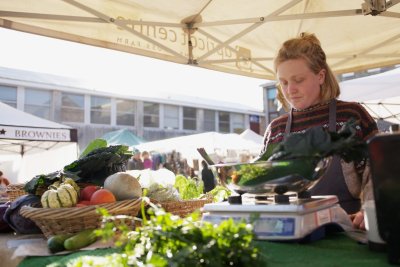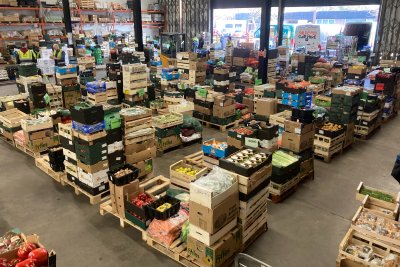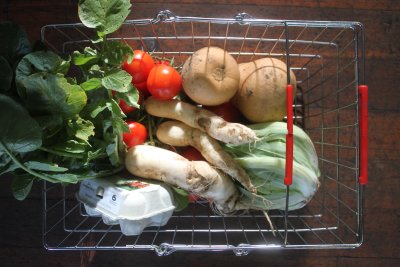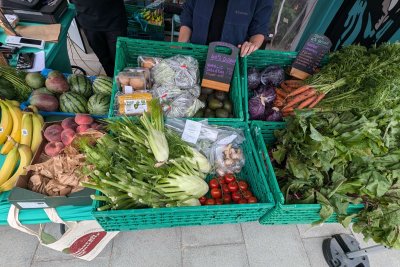 VideoSchool meals in Monmouth. Credit: Food Sense Wales / Aled Llywelyn
VideoSchool meals in Monmouth. Credit: Food Sense Wales / Aled Llywelyn
This is the conclusion of a report published by Food Sense Wales that notes the findings of the Welsh Veg in Schools participatory action research pilot, and documents the initiative’s impact since its inception in 2023.
The Welsh Veg in Schools report also found that by adding 3.3p per meal per day to the price paid by Local Authorities and Welsh Government would allow for 2 portions of local organic veg to be included seasonally and would incentivise the following benefits:
- 901 tonnes purchased would provide £2.21 million direct to Welsh producers with a multiplier of 3.7 to give an estimated £8.2 million in social, economic and environmental benefit
- £552,500 investment in infrastructure
- Increased capacity to supply and increased average farm income in Wales
- More resilience in the supply chain
- 74.3 FTE jobs on Welsh farms
- 50 hectares of organic veg
- 226 tonnes CO2e saving
- 35% increase in birdlife in fields
- Reduced reliance on imports from countries at high risk of water scarcity
Welsh Veg in Schools is a collaborative effort to supply organic, locally grown vegetables to schools across Wales. It is co-ordinated by Food Sense Wales and works with partners that include Castell Howell, Farming Connect Horticulture as well as a host of enthusiastic growers.
Sustain programme Bridging the Gap is a part funder of the project together with Welsh Government, the Shared Prosperity Fund, and with the support of Castell Howell. This has allowed the project to bridge the price gap, ensuring that the cost of organic produce remains affordable for schools and local authorities.
What began as a small pilot project has since grown into a movement and in 2024, Welsh Veg in Schools served 200,000 portions of fresh, organic veg in more than 200 schools across Wales.
Report author, Dr Amber Wheeler said:
“What’s been achieved in Wales on getting locally grown organic veg through public procurement into schools is massive and pioneering and is the result of the fantastic collaboration across the supply chain as well as the support from Government. The most important thing is that the needs of growers and farmers have been put at the heart. They need as much support as they can get if we are going to transform our local food supply chains for the better. The next step needed is the investment in scaling up infrastructure both on farms and in processing.”
By encouraging growers to supply into public procurement through Welsh Veg in Schools, the scheme has helped to develop the horticulture sector in Wales, providing a host of benefits including a guaranteed income for the veg going into school kitchens.
Katie Palmer, Founder and Head of Food Sense Wales said:
“We simply don’t know how supply or affordability of imported fruit and veg will stand up to increasing global instability and the impacts of climate change. Investing in the capacity of local supply chains in Wales to provide organic fruit and veg to the most vulnerable in society - through our schools, hospitals and care homes - makes sense for local economies, it makes sense for climate and nature and makes sense to secure a resilient supply of nutritious food for current and future generations.”
Grower, Ruth Davies said:
“We’re delighted to be involved in this amazing project. It’s a fantastic opportunity to supply fresh, local food to local schools. At Gardd Enfys, we’re also working directly with schools to show children where their vegetables are grown and help them connect with the food on their plates.”
Looking to the Future: A Vision for 2030
The ultimate goal of Welsh Veg in Schools is for 25% of all vegetables used in primary school meals in Wales to be locally grown and organic by 2030. To achieve this, the initiative will continue to expand, with plans to reach 12 local authorities in 2025, engaging even more schools, farmers, and communities across Wales. As the project scales up, the report notes a list of recommendations including:
- More support for growers, including training and infrastructure development.
- The need for a stronger, more resilient local food system that reduces Wales’ reliance on imported produce and boosts the rural economy
- Increased opportunities for children to learn more about food and where it comes from, as well as opportunities for school catering staff to develop their veg skills
“We are incredibly proud of what we have achieved so far, but we know there is still much work to do. This work is a huge collective endeavour and its success is a testament to the collaborative energy and the investment of multiple stakeholders in Wales; partners in the UK, and our funders.” adds Katie
Read the reports by clicking on the relevant links below:
Welsh Veg in Schools: Summary Report
Bridging the Gap: Exploring ways to make organic food more accessible via farmer-focused supply chains.








